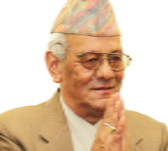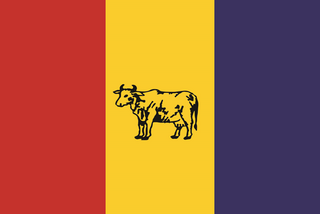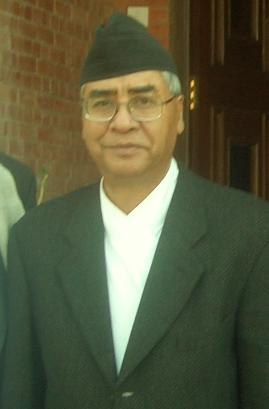
The politics of Nepal functions within the framework of a parliamentary republic with a multi-party system. Executive power is exercised by the Prime Minister and their cabinet, while legislative power is vested in the Parliament.

The Nepali Congress is the oldest democratic socialist political party in Nepal and the largest party in the country. The party has 870,106 members as of the party's 14th general convention in December 2021 making them the largest party by membership in Nepal. In June 2023, the party started online membership since the emergence of youth leaders in vital post to bring youths into the party. The party is led by former prime minister, Sher Bahadur Deuba since the party's thirteenth general convention in 2016. The party won 89 seats in the 2022 general election and is currently the largest parliamentary group in the House of Representatives.

The Communist Party of Nepal (Unified Marxist–Leninist) (Nepali: नेपाल कम्युनिष्ट पार्टी (एकीकृत मार्क्सवादी-लेनिनवादी), romanized: nēpāl kamyuniṣṭ pārṭī (ēkīkṛt mārksavādī-lēninavādī); abbr. CPN (UML)) is a communist political party in Nepal. The party emerged as one of the major parties in Nepal after the end of the Panchayat era.

Sher Bahadur Deuba is a Nepali politician and former prime minister of Nepal. He has also been serving as the president of the Nepali Congress since 2016. Deuba has served five terms as prime minister and is the Member of Parliament for the parliamentary constituency of Dadeldhura 1.

Lokendra Bahadur Chand was the 27th prime minister of Nepal four times: from 1983 to 1986, briefly during April 1990, briefly during 1997 and from October 2002 until June 2003. He is also involved in literature and have won a Madan Puraskar for his book Bisarjan in 2054 B.S.

The Rastriya Prajatantra Party is a constitutional monarchist and Hindu nationalist political party in Nepal.

The Government of Nepal is the federal executive authority of Nepal. Prior to the abolition of the Nepali monarchy in 2006, it was officially known as His Majesty's Government.

The Rastriya Panchayat was the legislature of the Kingdom of Nepal from during the panchayat era from 1962 to 1990. Following the 1960 coup by King Mahendra, the enactment of the Constitution of 1962, made the Rastriya Panchayat the supreme legislative body in the country, replacing the Parliament of Nepal.

The revolution of 1951 in Nepal, also referred to as Sat Salko Kranti, was a political movement against the direct rule by the Rana dynasty of Nepal which had lasted for 104 years. It marks the beginning of the political awakening and democratic movements in Nepal, and resulted in immediate abolition of the institutionalized hereditary Prime Minister system in Nepal.

On 7 June 2017, Sher Bahadur Deuba got elected as the new Prime Minister of Nepal and therefore formed the new Governmental Cabinet of Nepal Deuba's candidacy was supported by the Rastriya Prajatantra Party Nepal, the Rastriya Janata Party Nepal, the Nepal Loktantrik Forum, the Federal Socialist Forum, Nepal and several small parties represented in the Nepalese Parliament after a power-sharing deal with the Communist Party of Nepal, who also supported Deuba's candidacy. After being sworn in, Deuba formed a new government in a coalition with the parties that supported his election. On 17 October 2017, in preparation for the Nepalese legislative election, the Communist Party of Nepal decided to cooperate with the Communist Party of Nepal. For this, all of their ministers left the cabinet after Prime Minister Deuba was prepared to dismiss them.

The Second Oli cabinet, also known as the Oli cabinet, 2018, was the Government of Nepal from 15 February 2018 to 13 July 2021. It initially formed as a majority coalition on 15 February 2018, after Khadga Prasad Sharma Oli was elected as the new Prime Minister of Nepal following the 2017 general election. Oli's candidacy was supported by the Communist Party of Nepal and the Communist Party of Nepal. He assumed his office with two ministers and the remaining ministers were added at later points. The CPN withdrew its support from the government in May 2021, reducing it to a minority, and after the dissolution of the House of Representatives, it turned into an interim government. The cabinet was replaced by the fifth Deuba cabinet, formed after the Supreme Court ordered the appointment of Nepali Congress president Sher Bahadur Deuba as prime minister under Article 76 (5) of the Constitution of Nepal.

The Fifth Deuba cabinet was the Government of Nepal from 13 July 2021 to 26 December 2022. It was formed after Sher Bahadur Deuba was appointed as the new prime minister of Nepal by president Bidya Devi Bhandari following an order from the Supreme Court, which declared the dissolution of the House of Representatives on the recommendation of former prime minister KP Sharma Oli to be unlawful. The fifth Deuba cabinet was replaced by the Dahal cabinet, 2022 on 26 December 2022, when Pushpa Kamal Dahal's CPN broke away from the electoral alliance with Nepali Congress and joined hands with other opposition parties to form a government in the aftermath of the 2022 general election.

The first Sher Bahadur Deuba cabinet was formed on 12 September 1995. After Man Mohan Adhikari lost support in the House of Representatives, he recommended to dissolve the lower house. However, the Supreme Court restored the lower house and King Birendra appointed Nepali Congress parliamentary party leader Sher Bahadur Deuba as prime minister on 11 September 1995. He was supported by the Rastriya Prajatantra Party and Nepal Sadbhawana Party.

The Chand–Gautam coalition was formed on 12 March 1997, after the biggest party in the House of Representatives, CPN (UML) supported Rastriya Prajatantra Party leader Lokendra Bahadur Chand as the prime minister. The cabinet was expanded on 25 March 1997, 30 June 1997 and 29 August 1997.
The fourth Surya Bahadur Thapa cabinet was formed on 7 October 1997. Surya Bahadur Thapa of the Rastriya Prajatantra Party was appointed as the prime minister by King Birendra after he was supported by Nepali Congress, Nepal Sadbhawana Party and some independents. The cabinet was expanded on 27 October 1997 and was reshuffled on 3 December 1997.
The fourth Girija Prasad Koirala cabinet was formed on 21 March 2000 after Nepali Congress leader Girija Prasad Koirala was appointed as the prime minister by King Birendra. After the His Majesty's Government Regulations 2000 came into effect on 18 April 2000, the cabinet was reformed. The cabinet was reshuffled on 7 February 2001.
The second Deuba cabinet was formed on 26 July 2001 after Nepali Congress leader Sher Bahadur Deuba was appointed as prime minister by King Gyanendra. The cabinet was expanded on 18 October 2001.
The fifth Surya Bahadur Thapa cabinet was formed on 11 June 2003 after King Gyanendra appointed Surya Bahadur Thapa as prime minister. The ministers were assigned extra portfolios on 1 August 2003.
The fifth Girija Prasad Koirala cabinet was formed on 29 April 2006 after Girija Prasad Koirala was appointed prime minister following the 2006 revolution. The cabinet was expanded on 22 May 2006 and again on 11 June 2006. The cabinet signed the Comprehensive Peace Accord with the CPN (Maoist).











